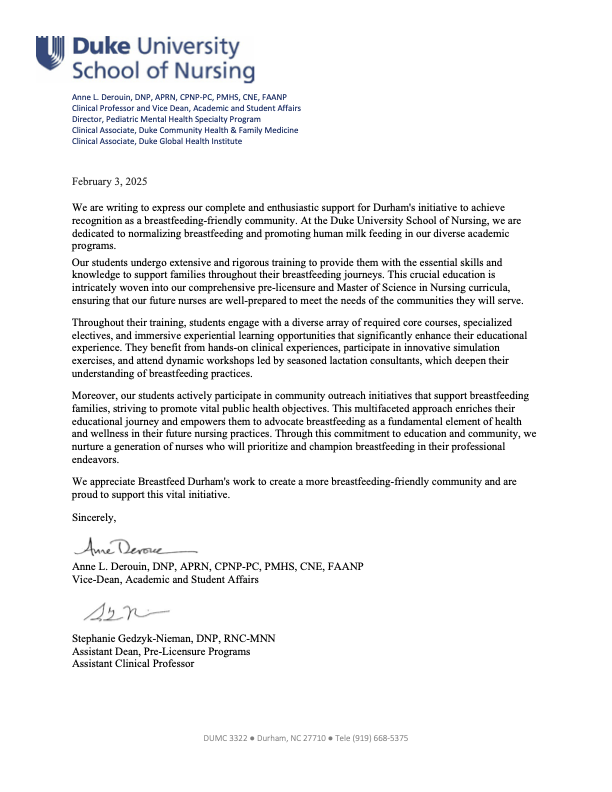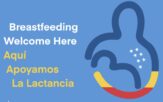Duke University has demonstrated a strong commitment to breastfeeding education, successfully fulfilling Step 10 of the Breastfeeding Family Friendly Community (BFFC) Designation. Step 10 emphasizes the integration of breastfeeding-friendly curricula at all levels of education, ensuring that individuals of all ages are exposed to chest/breastfeeding as a normative behavior.
Why Education Matters in Breastfeeding Support
To create a society where breastfeeding is understood and supported, education must start early and continue throughout all levels of schooling. Normalizing breastfeeding through educational systems is key to fostering a culture where human milk feeding is encouraged and supported across all sectors. Step 10 outlines specific measures to assess this progress:
- Schools and educational institutions incorporate books and images depicting breastfeeding as the norm.
- Breastfeeding-friendly curricula are introduced across all educational levels, from childcare through higher education.
Duke University has excelled in both of these areas through its School of Nursing, interdisciplinary collaborations, and community outreach initiatives.
Duke’s Commitment to Breastfeeding Education
The Duke University School of Nursing plays a pivotal role in educating future healthcare professionals on breastfeeding support and human milk feeding. As outlined in a letter of support from Dr. Anne L. Derouin, Vice Dean of Academic and Student Affairs, and Dr. Stephanie Gedzyk-Nieman, Assistant Dean of Pre-Licensure Programs, Duke incorporates breastfeeding education in both its pre-licensure and Master of Science in Nursing (MSN) curricula. This means every nursing student at Duke receives rigorous training on breastfeeding support, preparing them to serve families effectively.
The curriculum includes:
- Core courses and specialized electives that address lactation science, maternal-child health, and infant nutrition.
- Clinical experiences and community engagement, allowing students to practice hands-on support for breastfeeding families.
- Workshops and simulation exercises led by expert lactation consultants, ensuring students develop practical skills.

Beyond Nursing: A University-Wide Approach
Duke’s commitment to breastfeeding-friendly education extends beyond its nursing program.
- Interdisciplinary Collaborations: Graduate students from various health disciplines—including physician assistant, physical therapy, occupational therapy, and medical programs—are actively engaged in Breastfeed Durham projects. These students work alongside the community to support breastfeeding families and develop new initiatives.
- Community-Based Learning: Duke Service-Learning fosters real-world applications of breastfeeding education, ensuring that students understand the historical, cultural, and social contexts of lactation support. The university has partnered with Breastfeeding Family Friendly Communities to provide experiential learning opportunities.
- Research and Innovation: Duke students participate in Senior Design projects that explore innovative solutions to support breastfeeding families, including designing tools and strategies to make lactation support more accessible.
- Biomedical Engineering Design Team: Duke’s Biomedical Engineering Design team has contributed significantly by designing innovative devices to measure nipple size for breast pumps. This remarkable project resulted in three different designs aimed at solving this challenge, with students integrated across all perinatal health projects. Their work is a testament to Duke’s dedication to interdisciplinary collaboration in breastfeeding-friendly education.
Recognizing Duke’s Role in a Breastfeeding-Friendly Community
While Duke University has made significant progress in breastfeeding education, it is important to acknowledge that Duke University Hospital is not yet a Baby-Friendly Hospital. As a teaching hospital, there are still areas that require improvement to fully align with the Baby-Friendly Hospital Initiative (BFHI) and World Health Organization (WHO) guidelines. Additionally, some Duke-affiliated clinics have yet to fully comply with global breastfeeding-friendly standards. However, Duke has been actively working towards these goals, and Regional Hospital has recently achieved Baby-Friendly status. This progress is worth celebrating while recognizing that continued work is needed to improve compliance with Steps 5 and 8 of the BFFC Designation, which focus on breastfeeding-friendly hospital care and clinical support.
Assessment by the Designating Group
From 2024-2025, Fariha Rahman has served as the Policy Coordinator for Breastfeeding Family Friendly Communities, Inc., with her position funded through Duke University. Duke also provides funding for students in various programs across Durham to engage in breastfeeding and lactation-related initiatives.
The timeline for Duke University’s designation process reflects its sustained commitment to breastfeeding-friendly education:
- September 3, 2024 – Duke’s Biomedical Engineering Design Team initiates collaboration with Breastfeed Durham on lactation-related projects.
- November 3, 2024 – Duke’s Senior Design team schedules a meeting to present prototypes aimed at supporting breastfeeding families.
- November 18, 2024 – Duke’s Senior Design team invites Breastfeed Durham to its poster presentation session.
- January 30, 2025 – Graduate students from multiple disciplines begin their semester-long engagement with Breastfeed Durham.
- February 3, 2025 – Duke University School of Nursing issues a formal letter of support for Breastfeed Durham’s initiatives.
- February 10, 2025 – The Breastfeed Durham Designating Group conducts a formal review of Duke’s adherence to Step 10 of the BFFC Designation.
- February 28, 2025 – Duke Service-Learning hosts a Community Partner Breakfast to celebrate partnerships, including Breastfeed Durham.
The Breastfeed Durham Designating Group assessed Duke’s adherence to Step 10 through a formal review process conducted on February 10, 2025. The evaluation included:
- Curriculum integration of breastfeeding education.
- Partnerships with community organizations to promote breastfeeding awareness.
- Inclusion of breastfeeding images and materials in educational settings.
Through this thorough evaluation, Duke University successfully passes Step 10, reinforcing its role as a leader in breastfeeding advocacy within educational institutions.
Looking Ahead: Sustaining and Expanding Breastfeeding Education
As Duke continues to evolve in its breastfeeding-friendly initiatives, the university is positioned to expand education beyond the health fields, incorporating lactation education into disciplines such as public policy, social work, and early childhood education. With ongoing partnerships and community collaborations, Duke’s impact on breastfeeding support will continue to grow.
By setting this high standard for integrating breastfeeding education into academic curricula, Duke University is ensuring that breastfeeding remains a visible, supported, and normalized practice across all levels of education.
